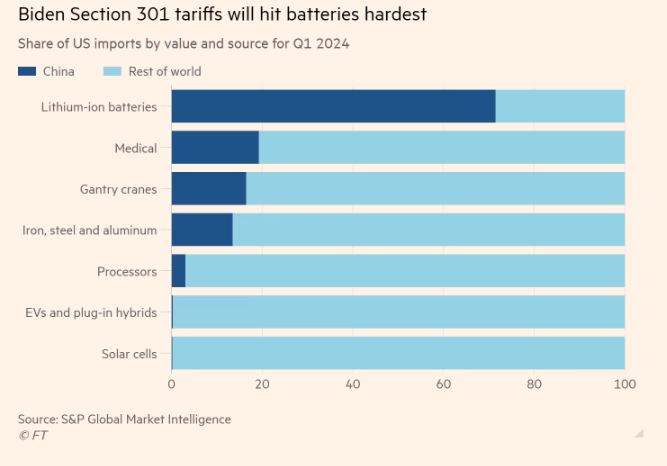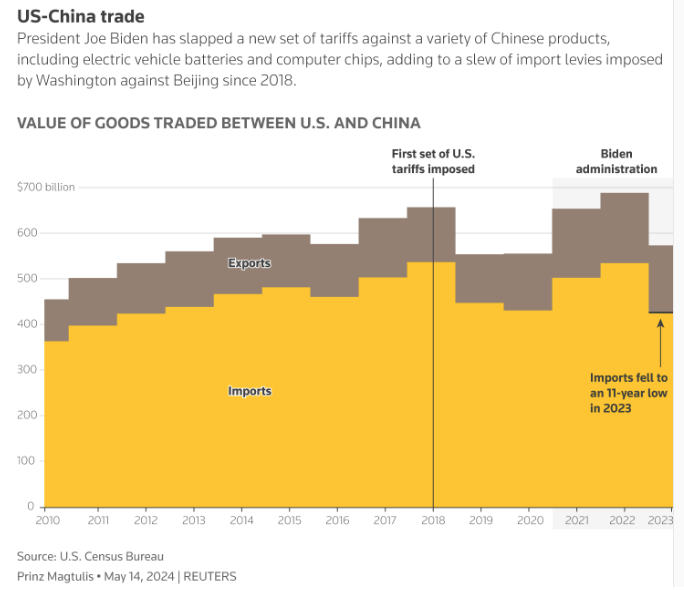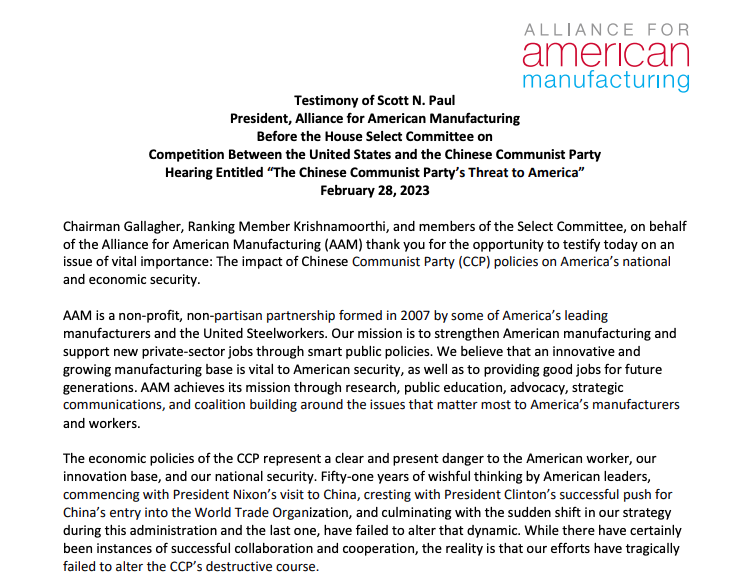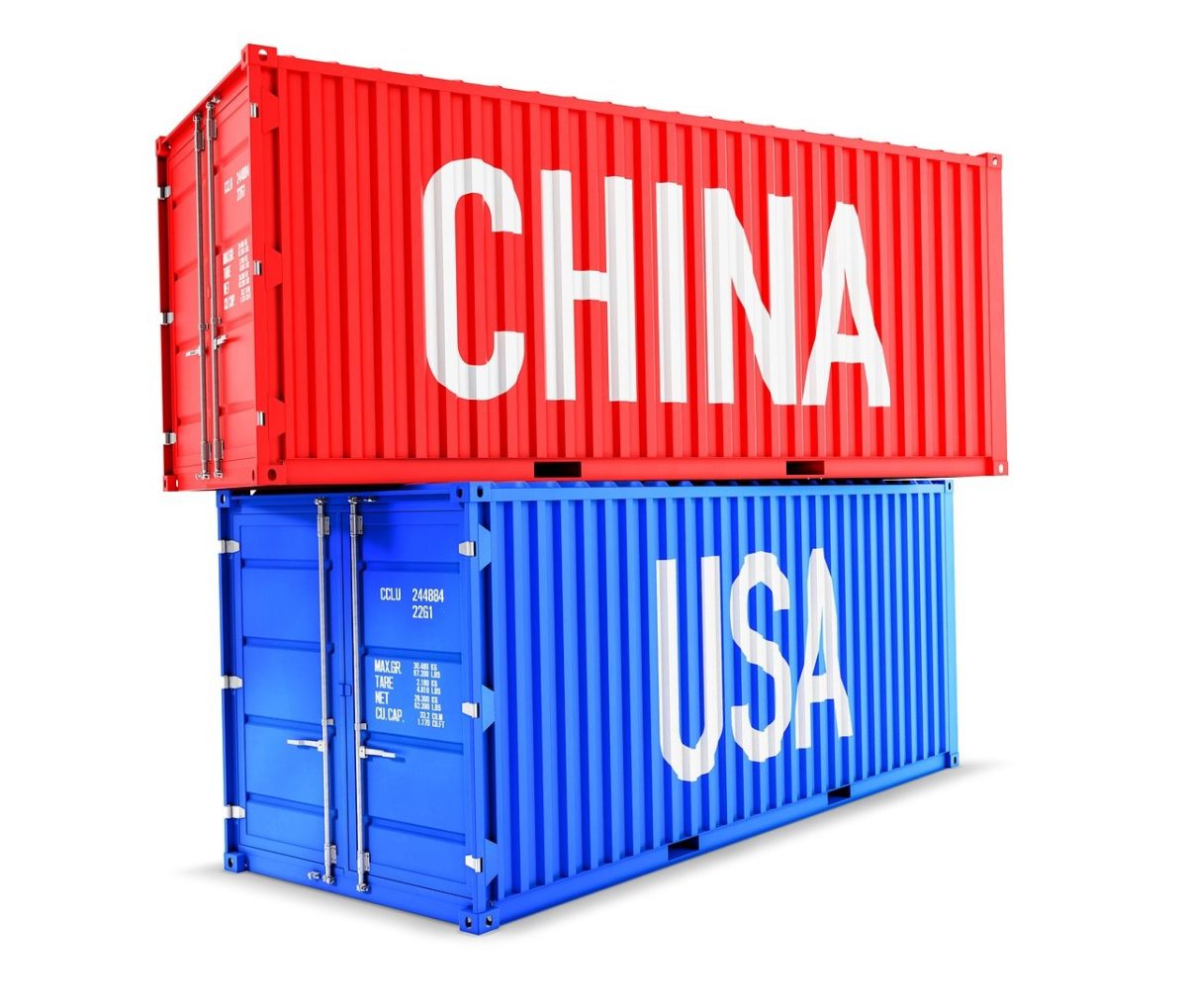Summary
- Tariff Increase: The Biden administration is set to increase tariffs on Chinese electric vehicles (EVs) from 25% to potentially 100%, significantly raising the cost of Chinese EVs in the US market.
- Geopolitical Strategy: This move aims to curtail China’s dominance in the global EV market and protect the nascent US clean energy sector from a flood of subsidised Chinese imports.
- Domestic Industrial Policy: The tariffs are part of Biden’s broader strategy to boost American manufacturing, specifically in the EV and clean energy sectors, to ensure national security and economic growth.
- Labour and Employment: The tariff policy is designed to support American jobs, particularly in the auto industry, resonating with labour unions and blue-collar workers in key battleground states.
- Electoral Strategy: With the 2024 presidential election approaching, Biden’s move to raise tariffs helps distinguish his trade policy from that of former President Trump, who has also advocated for high tariffs on Chinese goods.
Details: US Tariffs on Chinese Electric Vehicles
Last year, we posted about China’s dominance in the electric vehicles market (EVs). Quoting from the post:
China’s assertive expansion in the global EV market aligns with its broader geopolitical ambitions. By dominating this market, China not only capitalizes economically but also gains significant influence in shaping global standards and practices in the automotive industry. This strategic positioning allows China to extend its influence beyond its borders, using its EV industry as a conduit for expanding its soft power and international standing.
This week, the Biden administration is poised to significantly escalate tariffs on Chinese electric vehicles (EVs), raising them from the current 25% to potentially 100%. The move reflects both a strategic response to geopolitical competition with China and a tactical manoeuvre influenced by domestic political considerations as the 2024 presidential election approaches.
This dramatic move has geopolitical, economic and domestic US political considerations.
Geopolitical and Strategic Considerations
The imposition of tariffs on Chinese EVs is a clear indicator of the United States’ intent to curtail China’s growing dominance in the global EV market. China currently leads the world in EV production and sales, commanding over half of the global market share and controlling a substantial portion of the supply chain for critical components like lithium-ion batteries. The tariffs are designed to make Chinese EVs less competitive in the US market, thereby encouraging the growth of domestic EV manufacturers and reducing dependency on Chinese imports.

Domestic Political Context
Industrial Policy and Economic Strategy
For President Biden, these tariffs are part of a broader strategy to revitalise American manufacturing. The administration’s focus is on building a robust domestic supply chain for clean energy technologies, including EVs, batteries, and solar panels. This initiative is considered essential for both economic growth and national security, aiming to prevent market flooding by Chinese goods that are often subsidised by the Chinese government, leading to below-cost sales that undermine US industries.

Labour and Employment
Biden’s tariff policy resonates strongly with American labour unions and blue-collar workers, key constituencies that are crucial for electoral success. The United Auto Workers (UAW) and other labour groups have been vocal in their support for policies that protect and expand domestic employment in the auto industry. By imposing higher tariffs, Biden aims to secure these jobs, which is critical in battleground states like Michigan and Pennsylvania.
Electoral Strategy
The timing of the tariff announcement is strategically aligned with the upcoming presidential election. Biden faces a potential rematch with former President Donald Trump, who has promised to impose even higher tariffs on Chinese goods if re-elected. By increasing tariffs now, Biden aims to draw a clear distinction between his approach and that of his predecessor, while also addressing bipartisan concerns over China’s trade practices and their impact on American workers.

Additionally, Biden’s move to raise tariffs comes amid growing pressure from lawmakers and industry stakeholders to protect emerging US industries from unfair competition. This political calculus is evident as Biden seeks to consolidate support among labour unions and working-class voters, who were pivotal in his 2020 election victory.
Potential Implications and Future Outlook
The new tariffs are expected to significantly impact the cost structure of Chinese EVs, making them prohibitively expensive for US consumers. This protective measure is aimed at giving US-based EV manufacturers like Tesla and emerging companies a competitive edge in the domestic market. However, there are concerns about potential retaliatory actions from China, which could further strain US-China trade relations.
A broader situational analysis tells us that the Biden administration’s decision to impose higher tariffs on Chinese EVs is driven by a blend of strategic, economic, and political motivations. It underscores a broader effort to fortify American industrial capacity while navigating the complexities of great power competition and electoral politics. As the 2024 election approaches, these tariffs are likely to play a central role in the discourse around trade policy, economic security, and the future of American manufacturing.

One thought on “Chinese electric vehicles & soft power: situation update”
Comments are closed.